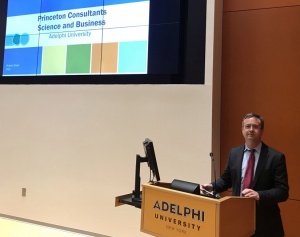
A former colleague recently offered “some controversial and unpopular advice on ultimately succeeding in academia” in University Business, which covers college and university management of enrollment, IT, facilities and academic affairs.
In “Why You Should Not Become an Adjunct--Yet,” Dr. Matthew Wright, chair of the Department of Physics at Adelphi University, encourages aspiring professors to leave the traditional academic career path and work in the private sector for a time. He was compelled to write the article after learning that many PhD’s awaiting full-time faculty positions obtain food from soup kitchens because of need. Through the right job, Matthew counsels, academics can earn much better income and moreover “develop an arsenal of skills and a network of people.”
Matthew writes, "Before I became a professor, I took my doctorate and found a job at Princeton Consultants. It’s an excellent firm. Each consultant did wonderful work. It was filled with intelligent, friendly people—many of whom had doctorates. Now, as a professor, I reference my work at that consulting firm more times than I can count."
When Matthew joined our firm, he was like many of our consultants: about 33% of our staff has earned a PhD (another third has a Masters) and 40% has a degree in Physics. For more than 35 years, Princeton Consultants has hired physicists and quantitative scientists with outstanding academic track records. Visit www.princeton.com/physics to learn more and view conversations.
“Physicists are malleable and can solve almost any problem,” Matthew says in conversation, and points out that our firm teaches them vital skills such as learning from a business’s subject matter experts, harnessing the problem-solving mindset in a meeting, and getting buy-in from clients. Many university students want to hand in the “perfect” paper, he observes, which is not realistic. Consulting work can teach them how to “build up” to a solution.
At Princeton Consultants, Matthew worked on a variety of strategic and operational projects for Fortune 500 companies. He admired our highly successful Rapid Application Delivery (RAD) sessions, an organized approach for turning top management vision into well-defined action plans, with a thorough analysis of issues and risks for each one. Matthew uses the methodology and umbrella of skills almost daily as a professor to overcome students’ tendency to fail to focus on deliverables.
Matthew says he could not write well when he joined Princeton Consultants, and it was an obstacle to success. Firm leaders gave him training practices for writing that he found invaluable. Now Matthew skillfully writes scholarly articles and presentations, grant applications, and teaching materials. He is also active on Twitter.
After leaving our firm, Matthew performed further post-doc studies at Harvard and then joined the faculty at Adelphi. Over the years, other members of Princeton Consultants, after thriving at our firm, have rejoined academia as a professor or researcher.
In early 2019, Matthew invited his friend and former colleague, Princeton Consultants Director Bob Steen—who holds a PhD in Space Physics and Astronomy—to speak to Adelphi students about the benefits of a career in consulting. Bob’s talk (pictured above) was a hit, Matthew wrote, affirming the career advice he offers in University Business. It is quite gratifying to read that his experience at Princeton Consultants was so enjoyable and edifying that he recommends it to students at Adelphi and beyond.
